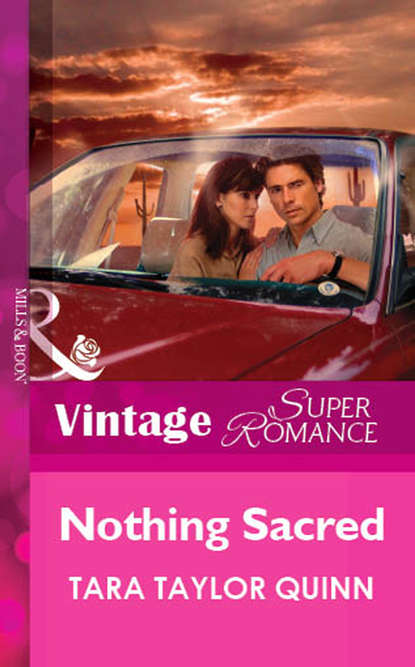По всем вопросам обращайтесь на: info@litportal.ru
(©) 2003-2024.
✖
Nothing Sacred
Автор
Год написания книги
2018
Настройки чтения
Размер шрифта
Высота строк
Поля
Yes.
He turned. And turned again, slowing when he drew close to his destination. “Something with which I am intimately familiar.”
Yes.
Peace settled just beneath his ribs as the next thought occurred to him. “And that makes me the right man for this job.”
Yes.
With this acknowledgment, the uphill struggle of the past six months—visiting home after home, seeking out people in their own surroundings, trying to break through the defensive walls that prevented him from doing his job as effectively as possible—ceased being such a drain on his emotional energy. “Thank you, Angel.” And you can kick me for taking six months to ask, he added as a silent afterthought.
You’re welcome. He was sure the angel was laughing.
David was laughing at himself, too, as he pulled into the driveway of his most standoffish—and yet, he suspected, one of his neediest—parishioners that Sunday afternoon in January.
He’d been trying to pin Martha Moore down to a visit since he’d arrived in Shelter Valley the previous summer. Today, he’d finally been given a very reluctant invitation—and only because he’d finally wised up and gone through her son, Tim. That was one young man who seemed open to new experiences, willing to give a new relationship a chance.
David was looking forward to getting to know Tim better.
He glanced at the well-worn, leather-bound Bible beside him, decided to leave it there, and climbed out of his car. Later. He’d get to the good book later.
DAVID WISHED HE’D BROUGHT the book. Not because he would’ve opened it. Or even considered reading from it. Certainly the atmosphere, even with the smell of chocolate chip cookies in the air, was not conducive to a sharing of his favorite passages.
No, facing the pleasant and completely empty smile of Martha Moore across the coffee table in her living room, David wished he had the book for purely selfish reasons. He wanted something to do with his hands.
No.
Okay, he wanted to hide behind the safety and security it represented.
Yes.
Yes. Well, angel, thanks a lot for that one. He listened while Martha told him how much she’d enjoyed his sermon that morning. He was almost positive she hadn’t heard a word of it. She’d been writing—and David would bet she hadn’t been taking notes on anything he’d had to say.
“So tell me, Pastor Marks, why did you join the ministry?”
“Mom!” Ellen Moore, Martha’s blond and beautiful eldest daughter, reprimanded with some firmness from the armchair facing her mother.
“Mom’s just a little prejudiced,” fifteen-year-old Rebecca explained wisely. Her leggy and very skinny body was sprawled next to her mother on the couch—across from the love seat where David sat.
“Yeah, she was the one who walked in on Edwards and a woman.” Tim piped up from the floor. With his arms over his head, his T-shirt was raised, giving David—and everyone else in the room—a look at the top three-quarters of the dark blue boxers he wore under the too-large khaki pants, which rested dangerously low. “Sly told me her bra was undone and everything.”
Sylvester Young was one of Shelter Valley’s most rambunctious but harmless thirteen-year-olds. From what David had seen, he was in the constant company of Tim Moore.
“Shut up, twerp.” Shelley reached forward from her seat on the couch to nudge her brother with her toe.
“Stop it,” Tim said, slapping at her foot. “Sly heard his mother talking to Pastor Edwards’s wife and that’s what she said.”
“What she said isn’t the point,” Martha insisted, at the same time leaning over Rebecca to place a warning hand on Shelley’s knee. “It simply isn’t your business to repeat something like that.”
Knocking her mother’s hand off her knee, Shelley turned her back on Tim. And looked right into David’s eyes.
The belligerence—and was that fear?—he saw there sent a jolt to his heart. He’d thought his job was merely to be friendly, offer a helping hand to a woman single-handedly doing the job of two people. He hadn’t realized there were problems other than a family stretched too thin. His work was going to require more of him than he’d expected.
Yes.
“I don’t mind your mother’s question, Ellen,” David said, including the entire Moore clan in his smile. “I became a minister so I could spend my life immersed in big-picture endeavors.”
“I don’t get it,” Rebecca said, one of her long, jean-clad legs swinging back and forth.
“Things that affect lifetimes instead of just minutes.”
His words were directed at Rebecca, but he spoke to her mother. He had a feeling big-picture issues were something Martha Moore would understand—if she let herself think about them.
“Why?” Martha was looking at him.
He held that gaze. “So I can make lives better, bring people hope and help them find a touch of the elusive joy most of us crave.”
No.
David wasn’t sure who’d delivered the message, his private angel or his own disgusted ego. Or maybe it had been her.
She turned to the window, but not before David saw the small glimmer of disappointment in Martha Moore’s remarkable brown eyes. This woman might want him to think she was hardened beyond hope.
But she wasn’t. Not quite yet.
Still, he couldn’t tell her the whole truth—which was what she’d seemed to need.
A father to many because he would never, ever father children of his own, a mentor and caregiver to all as he would never provide for a wife and family, David Cole Marks had a secret to keep.
Elbows on his knees, he clasped his hands between them. “You ever come up against things in life that just don’t make sense?” he asked.
“I do.” Tim piped up again from the floor, the electronic game he’d been engrossed in now ignored. “Algebra. It’s stupid. Why waste time with as and bs and stuff when you’re just gonna have to stick numbers in there, anyway?”
“You are so lame,” Shelley whispered, with a surreptitious glance at her mother.
“Of course I have.” Martha answered as though her children hadn’t spoken. “Most of the things that happen don’t make sense.”
“Exactly.” David nodded, his eyes on her bent head as he willed her to look up at him. To engage in what might be an actual conversation. “So instead of making myself crazy trying to find sense in senseless things, I decided to devote my energies to the pursuit of universal truths. I really believe that’s the only source of lasting peace and happiness.”
If he was ever going to be able to influence this very jaded woman, he’d have to speak with an honest and open heart. His sincerity, his conviction, would convey the power of his message.
Her head rose, her eyes slowly meeting his. He could read intelligence in their striking brown depths—and, after that initial second, the skepticism with which she considered his words.
“You’re paid to say stuff like that.”
And that was why David hated being a minister. People automatically assumed that his message was the stereotypical religious platitudes. But there was nothing stereotypical about what he had to teach.
About what he believed.











